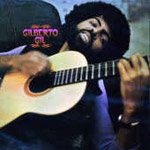Gilberto Gil’s story is an interesting one, but not atypical of many Brazilian musicians living in the 1960s era of violence, imprisonment, intimidation, and the attempted, but unsuccessful, suppression of its country’s outspoken singers. Starting his musical career after hearing João Gilberto on the radio, Gil gained a reputation as a troubadour of some worth after penning television ads and the hit single “Louvacao” for Elis Regina. As part of the Tropicalia movement, he, along with Caetano Veloso, Maria Bethania, Tom Zé, Os Mutantes, Gal Costa, and others, turned tradition on its head and laid the foundations of modern Brazilian music (Musica Popular Brasiliera or MPB) while at the same time ruffled the feathers of the ruling government by attacking its policies and practices through song.
The dictatorship at the time had cracked down on escalating protesting and free speech and felt necessary to stop the already-dying Tropicalismo scene by arresting and imprisoning Gil and life-long friend and fellow Bahian Veloso in December 1968 in São Paulo. Feeling strong pressure to leave the country after getting released from jail, Gil decided on England as his exile destination and took to London like a fish to water, soaking up the freedom, drugs, music, and the general hyper-creative atmosphere of late 1960s post-Swinging London. Gil went on to carve himself a varied and successful musical career which continues to this day. In an exquisite turn of events, Gil represents the very same government that jailed him those many years ago, acting as Brazil’s Minster of Culture since January 2003.
Gilberto Gil was his third eponymous album (often referred to as Nêga after its opening salvo) recorded and released in 1971 during his exile in London. Despite previously toggling between a number of styles, the sound on this album is a straightforward acoustic rumination on what must have been a tumultuous time characterized by his uprooting half a world away and the sad betrayal by his own county. If this all sounds like a dour protest album is in the cards, you could not be more wrong. In “Nêga,” a more impish start to an album is not imaginable. Random “woo!”s and shout outs, silly acoustic and electric guitar fills, and rattlesnake noises in the background punctuate a song that reminisces about a relationship by looking back at the lovers’ pictures taken at the time. It is a fun song that sets the tone for the whole album and clearly states Gil’s intentions. There is so much going on that you would half-expect him to start scatting any second during the song.
The scatting does start on Gil’s take on Blind Faith’s seminal “Can’t Find My Way Home,” which goes a long way to completely erasing the memory of the behemoth classic rock monster and replaces it with a simple arrangement of a man and his guitar. Upon hearing Gil’s “Can’t Find My Way Home,” it is difficult not to think of Seu Jorge’s David Bowie covers in The Life Aquatic with Steve Zissou, but without an English-to-Portuguese translation of the lyrics.
The lack of English proficiency actually lends itself to an even greater appreciation of the writing and brings an unintended childlike innocence to the lyrics throughout. It contains a simplicity sadly missing from native English speakers who vainly attempt to be purposely oblique or poetic and oft-times just end up sounding ridiculous. This unplanned device is particularly charming on tracks like “Volkswagen Blues” (“My lunar Volkswagen cabin/ With no men, no dog, no bag in/ Such an idea
thrills my soul/ Breaks down my self control”), “Babylon” (“’Cause I have a silver knife/ And my lover is Satan’s wife”), and the Hendrix-like “Crazy Pop Rock” (“From the city runs electricity in my brains/ From the city runs gasoline up in my veins”). “The Three Mushrooms” is exemplary of this as well. Gil strums psychedelically and expounds on opening his mind and body to the unknown. The song descends into a series of yelps of "atomic mushroom!" before Gil makes his way
headlong into frenetic fingerpicking at the end.
The three bonus tracks tacked onto the reissued Gilberto Gil are live em concerto in London: a rendition of the aforementioned “Can’t Find My Way Home,” a great version of “Up From the Skies,” (one of Jimi Hendrix’s more bouncy songs which Gil regularly performed around the UK during his exile), and “Sgt. Peppers,” complete with a surprisingly accurate voice-trumpet break. Unfortunately my Portuguese is not up to snuff enough to understand Gil’s between-song banter, but one would guess it is as entertaining as listening to the man perform his timeless numbers.
On record or live, Gil is all about emotion. Many of the songs on Gilberto Gil are simple renditions with voice and guitar (and a little scattered accompaniment for good measure), but what sets them apart from the low-eyed clown down at your local pub playing “Maggie’s Farm” for half-pints is the way Gil sings and plays. Carefree and 100% honest and pure, you cannot listen to Gilberto Gil without picturing the afro-ed master on the front cover smiling his way through another set of peaceful tunes calling for peaceful times, and it is hard to find anything wrong with that.
* bonus live tracks on CD
